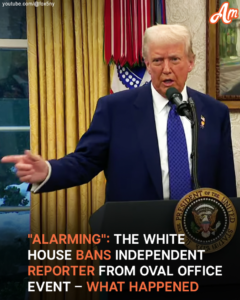The White House recently barred an Associated Press (AP) reporter from attending an Oval Office event due to the news agency’s refusal to adopt President Donald Trump’s directive to rename the Gulf of Mexico as the “Gulf of America.” This incident has raised significant concerns regarding press freedom and the First Amendment.
Background of the Dispute
In early February 2025, President Trump issued an executive order renaming the Gulf of Mexico to the “Gulf of America,” asserting that the new designation better reflects the region’s significance to both the United States and Mexico. This move was part of a broader initiative to rebrand various geographical features and landmarks.
The AP, adhering to its longstanding editorial guidelines, chose to continue using the traditional name, “Gulf of Mexico,” in its reporting. This decision led to tensions with the White House, which insisted that the AP adopt the new terminology.
The Incident
On February 11, 2025, an AP reporter attempted to attend a scheduled Oval Office event but was denied access by White House officials. The reporter was informed that entry was contingent upon the AP’s compliance with the new naming directive. This marked a significant escalation in the dispute, as the White House had previously threatened to restrict access to events for media outlets that did not conform to the new terminology.
Reactions and Implications
Julie Pace, the AP’s senior vice president and executive editor, condemned the White House’s actions, describing them as a violation of the First Amendment and an unacceptable infringement on press freedom. She emphasized that the AP would continue to use the traditional name, “Gulf of Mexico,” while acknowledging the president’s new designation.
The White House defended its decision, with Press Secretary Karoline Leavitt stating that media access is a privilege, not a right, and that the AP’s refusal to adopt the new terminology was spreading misinformation. Leavitt asserted that the administration had the authority to determine press access and criticized the AP for not aligning with the president’s directive.
The incident has sparked widespread concern among journalists and press advocacy groups. The White House Correspondents’ Association labeled the action as viewpoint discrimination and called for the restoration of press access. Legal experts have noted that such actions could set a concerning precedent for government interference in media operations.
Historical Context
This event echoes previous conflicts between the Trump administration and the media. In 2018, CNN reporter Kaitlan Collins was barred from a White House event after asking questions deemed inappropriate by the administration. The incident led to widespread criticism and raised questions about press access and freedom.
Conclusion
The White House’s decision to bar an AP reporter from an Oval Office event over a naming dispute underscores the ongoing tensions between the administration and the press. It highlights the delicate balance between government authority and press freedom, emphasizing the need for open and unfettered access to information in a democratic society.
